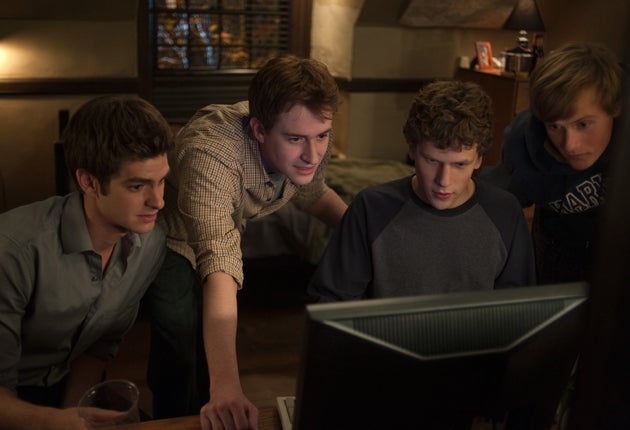The Social Network, David Fincher, 120 mins (12A)
A docu-drama about the Facebook founder thoughtfully fleshes out the stereotype of the nerdy misfit

David Fincher's docu-drama The Social Network has already been hailed as a film of its time – one that "brilliantly defines the decade", said Rolling Stone.
It would be nice to think that posterity will decide whether or not this film truly nails its epoch. But posterity seems beside the point regarding a movie about the creation of Facebook. If ever a film demanded instantaneous judgement, it's this drama about a determining moment in the culture of instantaneity.
Pacy though it is, The Social Network turns out to be a thoughtful, almost old-fashioned film largely about people talking in rooms. When it comes to directors of conversational drama, Fincher might not immediately come to mind, but you may think of writer Aaron Sorkin, creator of TV's The West Wing. The opening scene is typical of his sharply honed dialogue. It's a bar-room tête-à-tête between Harvard student Mark Zuckerberg (Jesse Eisenberg) and his girlfriend Erica (Rooney Mara). The camera ping-pongs between close-ups of the two, the talk snapping in brisk volleys which, at first, are hard to get a purchase on because of Zuckerberg's sullen machine-gun diction. He carps about status and the impossibility of getting into Harvard's exclusive "final clubs"; she complains about his monomaniac energy ("Dating you is like dating a Stairmaster") before telling him they're through. That very night in 2003 – according to this creation myth – Zuckerberg takes his first step towards creating Facebook, as he sits at his keyboard to take embittered revenge on Erica. Soon the old world, in which people communicated by talking over tables, will be one step towards extinction.
The possible death of real-world intimacy is an anxiety at the heart of this drama, based on Ben Mezrich's book The Accidental Billionaires. This could have been a film of snazzy graphics scrolling before our aching eyes. Instead, the makers ask us to grasp social and psychological nuance. Astutely managing its high-speed data-flow, The Social Network is the screen equivalent of an expansive New Yorker article. It offers a layered account from different perspectives, cutting restlessly between the invention of Facebook and two legal disputes with Zuckerberg's Harvard contemporaries. One suit is brought by the athletic, moneyed Winklevoss twins, who claim that he stole their idea (the "Winklevi", Zuckerberg sneeringly calls the brothers, both played by Armie Hammer). The other suit is from Zuckerberg's friend Eduardo Saverin (Andrew Garfield), elbowed out of the company he co-founded.
At the film's centre is a precocious obsessive who managed to overturn the Ivy League rules of social entitlement, pulling the rug from under his rivals' Olympian feet. Yet we end up feeling almost sorry for the Winklevi. When they finally drop their attachment to gentlemanly fair play – "Screw it, let's get the frigging nerd!" – it's almost cathartic. As for Zuckerberg, he's hardly a conventional hero to root for. Diffident, petulant, arrogant, he shows up to his legal hearings with a mixture of timidity and contempt: "You have a part of my attention," he sniffs, "the minimum amount." Zuckerberg's eventual triumph is a snotty thumbed nose to the world: his business card reads: "I'm CEO ... bitch."
The film's central irony is the idea of a world-connecting social tool created by an inveterate loner. Early on, Zuckerberg scuffles across Harvard's campus, huddled, hoodied and lost in the crowd. The film's deep subject is outsiderhood. Fincher shows us the parties that Zuckerberg can never get into, at frat houses that boast of aristocratic exclusivity, where female students are bussed in for mating rituals. While young gods revel, history is made by boffins working late in chilly dorms.
If there's a truly sympathetic figure here, it's Saverin, who gives Zuckerberg not only finance but also the essential algorithm that gets the ball rolling. The film is in no small part a tragic love story between these two boys, their romance ending with the entry of Mephistopheles figure Sean Parker, controversial figurehead of Napster, who quickly latches on to Facebook's potential. The restaurant scene in which he seduces Zuckerberg from under Saverin's nose is terrific and chilling, and it's a brilliant move to cast Justin Timberlake as Parker, a monster of pop-star charisma and party-animal arrogance.
The film's central enigma is Zuckerberg, superbly played by Eisenberg as a hunched man-boy, his whey face a sullen blank, eyes ticking away over some other thought beaming in from elsewhere. Zuckerberg variously comes across as loathsome, near-autistic, just plain sad – a prodigy who has no idea how to be an adult, no grasp of social ethics. But the film is also about the dawning of his moral consciousness. As told by Fincher and Sorkin, this is not just the story of a lonely boy for whom success and chronic inadequacy go hand in hand – it's a tragedy as resonant as Citizen Kane. Right at the end, Zuckerberg, alone in a lawyer's office, adds his old girlfriend Erica as a Facebook friend: immensely poignant, this is his own Rosebud moment. A closing caption tells us that Zuckerberg, 26, is now the world's youngest billionaire. That looks very much like a synonym for "loneliest kid on the block".
Next Week:
Jonathan Romney watches Carlos, an epic investigation into the life of the Seventies terrorist
Subscribe to Independent Premium to bookmark this article
Want to bookmark your favourite articles and stories to read or reference later? Start your Independent Premium subscription today.

Join our commenting forum
Join thought-provoking conversations, follow other Independent readers and see their replies
Comments